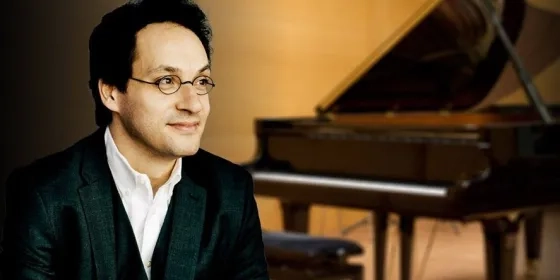SFCM Masterclass with Shai Wosner: The Top Takeaways
Avery Fisher Career Grant winner, Opus 3 Artist, and Pianist Shai Wosner gave a masterclass this month for musicians at SFCM, where he shared some tips for the next generation.
This month Famous Pianist and Opus 3 Artist Shai Wosner gave a masterclass and performance for SFCM students. The partnership with the Opus 3’s alliance made in 2020 with SFCM, aims to improve and enhance the student experience. Here are the highlights you may have missed from Shai Wosner’s performance and some words of wisdom for pianists and other future professional musicians. In addition, SFCM is a curator on Apple Music, and this month our playlist includes a specially catered collection of work featuring Shai Wosner, you can listen for yourself on Apple music or Spotify.
Music is Harmony
1.) In music we don't always know how long the phrase is, we don’t know how to treat it or shape it or when it ends. We don’t have a period, like in text, but then so how do you know? The answer? The harmony. Why is it not the melody or rhythm? It’s because harmony determines what the rhythm, and melody do, not the other way around.
Let it go
2.) Try for more release, it’s rare for every single note in a passage to be played fortissimo, try coming from the keys, then upward, rather than frozen and coming from above, come from the keys and then upwards, kind of pinch the keys. If you try to include the release of the note itself as you approach the note, it will make a difference in how you play.
Rubato is not Robotic
3.) Rubato is more effective if there is a framework, and context. Here, the context is not so much within the bars because they go by so fast, but it’s in the groupings. Have you thought of the groupings of the bars? Do they fit into some sort of pattern?
Avoid Patterns, Embrace Spontaneity
4.) Another thing to think about when it comes to rubato, is to make sure you don’t fall into patterns. As soon as you do the same rubato, three times in a row, usually even two times, it becomes a pattern, and if it becomes a pattern, then it doesn't sound like rubato, not something spontaneous and creative.
Control the Keys
It’s good if you are able to create intensity, and still plan to be smart about it. As pianists it’s extremely important to know the orchestral repertoire, or opera too. Our instrument—more than any other instrument by far—spends most of the time pretending like it's something else, a singer, a violin, a string quartet, and in this case definitely a symphony orchestra.
Listen, Listen, Listen
While playing in an orchestra. The reason I'm telling you this is because it's much easier to get all of these colors and how the music evolves symphonically. If it’s in your ears… it's easier already, and that’s the key to success
Learn more about studying piano at SFCM.
